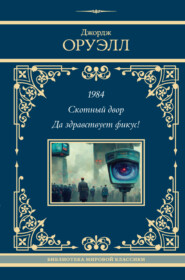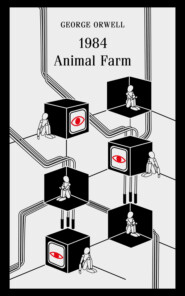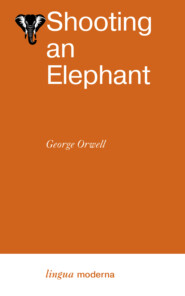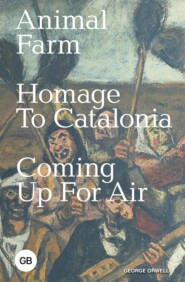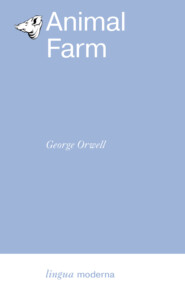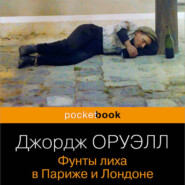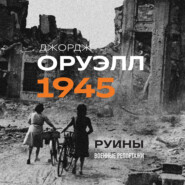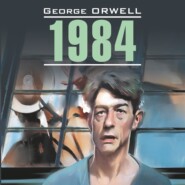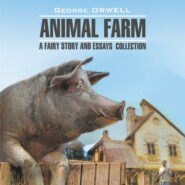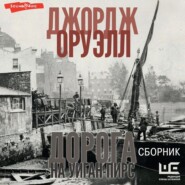По всем вопросам обращайтесь на: info@litportal.ru
(©) 2003-2024.
✖
Animal farm / Скотный двор. Уровень 2
Настройки чтения
Размер шрифта
Высота строк
Поля
The animals now reassembled in the excitement. Everyone recounted his own exploits in the battle. They celebrated the victory! They ran up the flag and sang 'Beasts of England’. The poor sheep was buried. A hawthorn bush was planted on her grave.
At the graveside Snowball made a little speech. He emphasized the need for all animals to be ready to die for the Animal Farm. The animals decided unanimously to create a military decoration[19 - military decoration – воинская награда], “Animal Hero, First Class”. Snowball and Boxer were rewarded. It consisted of a brass medal (an old horse-brass from the harness-room). There was also “Animal Hero, Second Class”: the dead sheep was rewarded posthumously.
The animals named this fight “The Battle of the Cowshed”. The animals set Mr. Jones’s gun at the foot of the Flagstaff to fire it twice a year. October the twelfth was the anniversary of the Battle of the Cowshed. And Midsummer Day was the anniversary of the Rebellion.
Chapter V
In winter, Mollie became more and more troublesome. She was late for work every morning, and she complained of mysterious pains. But her appetite was excellent. She often ran away from work and went to the drinking pool. There she stood and gazed foolishly at her own reflection in the water. But there were something more serious. One day, when Mollie flirted her long tail and chewed at a stalk of hay, Clover took her aside.
“Mollie,” she said, “I have something very serious to say to you. This morning you looked over the hedge that divides Animal Farm from Foxwood. One of Mr. Pilkington’s men stood on the other side of the hedge. And I saw this-he talked to you and you allowed him to stroke your nose. What does that mean, Mollie?”
“He didn’t! I wasn’t! It isn’t true!” cried Mollie.
“Mollie! Look at me. Do you give me your word of honour that the man did not stroke your nose?”
“It isn’t true!” repeated Mollie, but she did not look at Clover. The next moment she galloped away into the field.
Clover did not say anything to the others. She went to Mollie’s stall and turned over the straw with her hoof. Clover found a little pile of lump sugar and several bunches of ribbon of different colours under the straw.
Three days later Mollie disappeared. For some weeks nobody saw her. Then the pigeons reported that they saw her on the other side of Willingdon. She was between the shafts of a smart dogcart, which was outside a public-house[20 - public-house – таверна]. A fat red-faced man in breeches and gaiters, probably a publican[21 - publican – трактирщик], stroked her nose and fed her with sugar. She had a new coat and she wore a scarlet ribbon round her forelock. She was happy, so the pigeons said. None of the animals ever mentioned Mollie again.
In January there came hard weather. The earth was like iron, and the animals did not work in the fields. They attended meetings in the big barn. The pigs planned out the future work. The pigs, who were manifestly cleverer than the other animals, will decide all questions of farm policy. But their decisions will be ratified by a majority vote.
This arrangement worked well enough. But the disputes between Snowball and Napoleon! These two disagreed at every point where disagreement was possible. If one of them offered to sow a bigger acreage with barley, the other demanded a bigger acreage of oats. If one of them said that a field was just right for cabbages, the other declared that it was useless for anything except roots. There were violent debates between them. At the Meetings Snowball often won over the majority by his brilliant speeches. But Napoleon was better at intrigues. He was especially successful with the sheep. The sheep often bleated “Four legs good, two legs bad”, and they often interrupted the Meeting with this. They began to bleat “Four legs good, two legs bad” at crucial moments in Snowball’s speeches.
Snowball read some 'Farmer and Stockbreeder’ magazines which he found in the farmhouse. He was full of plans for innovations and improvements. He talked learnedly about field drains, silage, and basic slag. He worked out a complicated scheme for all the animals to drop their dung directly in the fields, at a different spot every day, to save the labour of cartage. Napoleon said quietly that Snowball did nothing useful, and just wasted his time. But then the problem of the windmill came.
In the long pasture, not far from the farm buildings, there was a small knoll. It was the highest point on the farm. Snowball declared that this was just the place for a windmill. This windmill will operate a dynamo and supply the farm with electrical power! This will light the stalls and warm them in winter, and will also run a circular saw, a chaff-cutter[22 - chaff-cutter – соломорезка], a mangel-slicer[23 - mangel-slicer – свекломешалка], and an electric milkingmachine[24 - milking machine – доилка]. The animals listened in astonishment. And Snowball talked and talked about these fantastic machines
The mechanical details came mostly from three books which belonged to Mr. Jones: 'One Thousand Useful Things to Do About the House’, 'Every Man Is A Bricklayer’, and 'Electricity for Beginners’. Snowball worked in a shed which had a smooth wooden floor. With a piece of chalk between the knuckles of his trotter, he moved rapidly to and fro. He drew and read, line after line, he uttered little whimpers of excitement. The other animals came to look at Snowball’s pictures at least once a day. Even the hens and ducks came. Only Napoleon was indifferent. He talked against the windmill. One day, however, he arrived unexpectedly to examine the plans. He walked round the shed, and looked closely at every detail of the plans. Then he snuffed at them once or twice. After that he suddenly he lifted his leg and urinated over the plans. Then he walked out.
The whole farm was divided on the subject of the windmill. Snowball did not deny that to build it was a difficult business. The animals must carry stones and make the sails. Then they will need dynamos and cables. Snowball did not say how to get them. But he promised to build the windmill in a year. And thereafter, the animals will work three days a week.
Napoleon, on the other hand, argued that the great need of the moment was to increase food production. If the animals waste time on the windmill they will all starve to death.
The animals formed themselves into two factions under the slogan, “Vote for Snowball and the three-day week” and “Vote for Napoleon and the full manger”. Benjamin was the only animal who did not joined any faction. He did not believe anybody. Windmill or no windmill, life will go on, badly.
And there was the question of the defence of the farm. The men can make another and more determined attempt to recapture the farm and reinstate Mr. Jones. The news of their defeat made the animals on the neighbouring farms more restive than ever. As usual, Snowball and Napoleon were in disagreement. According to Napoleon, what the animals must do was to procure firearms. According to Snowball, they must send out more and more pigeons and stir up rebellion among the animals on the other farms.
The animals listened first to Napoleon, then to Snowball. They did not know which was right. Indeed, they always liked the one who spoke at the moment.
At last the day came when Snowball’s plans were completed. At the Meeting on the following Sunday the question of the windmill was put to the vote. When the animals assembled in the big barn, Snowball stood up and advocated the building of the windmill.
Then Napoleon stood up to reply. He said very quietly that the windmill was nonsense. Napoleon advised nobody to vote for it, and promptly sat down again. At this Snowball sprang to his feet. In a moment Snowball’s eloquence carried the animals away. He painted a wonderful picture of the future Animal Farm. His imagination was far beyond chaff-cutters and turnip-slicers. Electricity will operate threshing machines, ploughs, harrows, rollers, and reapers and binders. Electricity will supply every stall with its own electric light, hot and cold water, and an electric heater. There will be no doubt how to vote will go now. But just at this moment Napoleon stood up and uttered a strange whimper.
Nine enormous dogs came into the barn. They dashed straight for Snowball. Snowball sprang from his place to escape their jaws. In a moment he was out of the door and the dogs were after him. All the animals were very amazed and frightened. They did not speak. Snowball raced across the long pasture that led to the road. Then he slipped through a hole in the hedge and ran away.
The animals were silent and terrified. They crept back into the barn. In a moment the dogs came back. Where did these creatures come from? They were the puppies whom Napoleon took away from their mothers and reared privately. They were huge dogs, and as fierce as wolves. They kept close to Napoleon and wagged their tails to him.
Napoleon, with the dogs, now mounted on to deliver his speech. The Sunday-morning Meetings will come to an end. They were unnecessary, he said, and wasted time. In future all questions will be settled by a special committee of pigs. He himself will preside. Then the others will learn the decisions. The animals will still assemble on Sunday mornings to salute the flag, sing 'Beasts of England’, and receive their orders for the week. But there will be no more debates.
Snowball’s expulsion gave the animals the great shock. They were dismayed by this announcement. Several of them even wanted to protest but they did not find the right arguments. Even Boxer was vaguely troubled. He shook his forelock several times, and tried hard to marshal his thoughts. But in the end he did not say anything. Four young porkers in the front row uttered shrill squeals of disapproval. All four of them sprang to their feet and began to speak at once. But suddenly the dogs growled, and the pigs sat down again. Then the sheep began to bleat “Four legs good, two legs bad!” and put an end to any discussion.
Afterwards Squealer explained the new arrangement to the others.
“Comrades,” he said, “I trust that every animal here appreciates this Comrade Napoleon’s sacrifice. Do not imagine, comrades, that leadership is a pleasure! On the contrary, it is a deep and heavy responsibility. No one believes more firmly than Comrade Napoleon that all animals are equal. But sometimes you make the wrong decisions, comrades, and then where will we be? If you followed Snowball-Snowball, who, as we now know, was a criminal…”
“He fought bravely at the Battle of the Cowshed,” said somebody.
“Bravery is not enough,” said Squealer. “Loyalty and obedience are more important. So the Battle of the Cowshed… I believe the time will come when we shall find that Snowball’s part in it was much exaggerated. Discipline, comrades, iron discipline! That is the watchword for today. One false step, and our enemies will be here. Surely, comrades, you do not want to see Jones again!”
Once again this argument was unanswerable. Certainly the animals did not want Jones back. Boxer thought and said:
“If Comrade Napoleon says it, it must be right.”
And from then on he adopted the maxim, “Napoleon is always right,” in addition to his private motto of “I will work harder.”
By this time the spring ploughing began. The shed where Snowball drew his plans of the windmill was shut up. Every Sunday morning at ten o’clock the animals assembled in the big barn to receive their orders for the week. The skull of old Major was disinterred from the orchard and set up on a stump at the foot of the flagstaff, beside the gun. The animals must go past the skull in a reverent manner and only after that enter the barn.
Nowadays they did not sit all together. Napoleon, with Squealer and another pig named Minimus, who had a remarkable gift – he composed songs and poems – sat on the front of the platform. Nine young dogs formed a semicircle round them. The other pigs sat behind. The rest of the animals sat in the main body of the barn and faced them. Napoleon read out the orders for the week in a gruff style, and after 'Beasts of England’, all the animals dispersed.
On the third Sunday after Snowball’s expulsion, the animals were surprised. Napoleon had something to announce. The windmill will be built! He changed his mind and did not explain it. This extra task means very hard work, it will be necessary to reduce their rations. A special committee of pigs will work on it. The building of the windmill, with various other improvements, will take two years.
That evening Squealer explained privately to the other animals that Napoleon was never in reality opposed to the windmill. On the contrary, it was he who advocated it in the beginning. Snowball actually stole the plan of the windmill from Napoleon’s papers. The windmill was, in fact, Napoleon’s own creation. Why, then, asked somebody, did he speak so strongly against it? Here Squealer looked very sly. That, he said, was Comrade Napoleon’s cunning. It was a manoeuvre to get rid of Snowball, who was a dangerous criminal. Now Snowball is far way, and the plan can go forward without his interference. This, said Squealer, was tactics. He repeated some times, “Tactics, comrades, tactics!”
The animals were not certain what the word meant. But Squealer spoke so persuasively, and the three dogs growled so threateningly, that they accepted his explanation without further questions.
Chapter VI
All that year the animals worked like slaves. But they were happy in their work. They were aware that everything that they did was for the benefit of themselves, and not for those idle men who were just thieves.
Throughout the spring and summer they worked a sixty-hour week. In August Napoleon made an announcement. They will work on Sunday afternoons as well. This work is strictly voluntary, but any animal who absents himself from it will have his rations reduced by half.
The harvest was less successful than in the previous year, and two fields were not sown. The winter will be a hard one.
The windmill presented unexpected difficulties. They saw limestone, plenty of sand and cement on the farm and in an outhouse. They had all the materials for building. But the problem was how to break up the stone into pieces. Picks and crowbars? No animal was able to use them, because nobody stood on his hind legs. Then the right idea occurred to somebody – namely, to utilize the force of gravity. They took huge boulders. The animals lashed ropes round these. Then all together, cows, horses, sheep-even the pigs sometimes joined in at critical moments-they dragged them with desperate slowness up the slope to the top of the quarry, where they were toppled over the edge, to shatter to pieces below. To transport the broken stone was comparatively simple. The horses carried it off in cart-loads, the sheep dragged single blocks. Even Muriel and Benjamin yoked themselves into an old cart. Then the building began, under the superintendence of the pigs.
But it was a slow, laborious process. Nothing was possible without Boxer, whose strength was enormous. When the boulder began to slip and the animals cried out in despair, it was always Boxer who strained himself against the rope and brought the boulder to a stop.
Clover warned him sometimes to be careful not to overstrain himself. Boxer never listened to her. His two slogans, “I will work harder” and “Napoleon is always right,” was a sufficient answer to all problems. He woke up three-quarters of an hour earlier in the mornings instead of half an hour. And in his free time, he went alone to the quarry, collected broken stones, and dragged them down.
The animals were not unhappy throughout that summer, in spite of the hardness of their work. They had no more food than in Jones’s day, but at least they did not have less. They must feed only themselves, and must not support five extravagant men! And the animal method of work was more efficient and saved labour. Since no animal now stole, it was unnecessary to fence off pasture from arable land.
Nevertheless, there was need of paraffin oil, nails, string, dog biscuits, and iron for the horses’ shoes. The farm produced nothing. Later they will also need seeds and artificial manures, besides various tools and, finally, the machinery for the windmill. How to get them? No one was able to imagine.
One Sunday morning, when the animals assembled to receive their orders, Napoleon announced a new policy. Animal Farm will engage in trade with the neighbouring farms. Not, of course, for any commercial purpose, but simply in order to obtain certain materials which were urgently necessary. The needs of the windmill must override everything else, he said. Therefore he made arrangements to sell hay and part of the current year’s wheat crop, and later on, eggs, for which there was always a market in Willingdon. The hens will welcome this sacrifice towards the building of the windmill.
Once again the animals were uneasy. Their resolutions were as these: never to have any business with men, never to engage in trade, never to use money. All the animals remembered such resolutions. At least they thought that they remembered them. Four young pigs raised their voices timidly, but they heard a tremendous growling from the dogs. Then, as usual, the sheep began to bleat “Four legs good, two legs bad!”






